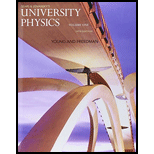
Concept explainers
In what ways photons resemble other particles such as electrons and what way do they differ and whether the photons have mass and electric charge. Also determine if photons can be accelerated and their mechanical properties.
Answer to Problem 38.1DQ
Photons are elementary particles like electrons but are force carriers and not part of matter. Photons have zero rest mass and are charge less particles. Photons cannot be accelerated in the local frame and have momentum and energy proportional to the frequency.
Explanation of Solution
The packages of
Photons are elementary particle that are force carriers of electromagnetic force. Electron are fundamental particles but are not force carriers rather constituents of matter. Both electron and photon exhibit wave-particle duality and are quantum particles. Electrons are charged while photons are charge less.
Photons have zero rest mass. They move with a constant velocity given by
Conclusion:
Thus, photons are elementary particles like electrons but are force carriers and not part of matter. Photons have zero rest mass and are charge less particles. Photons cannot be accelerated in the local frame and have momentum and energy proportional to the frequency.
Want to see more full solutions like this?
Chapter 38 Solutions
University Physics with Modern Physics, Volume 1 (Chs. 1-20) and Mastering Physics with Pearson eText & ValuePack Access Card (14th Edition)
- Why are X-rays emitted only for electron transitions to inner shells? What type of photon is emitted for transitions between outer shells?arrow_forwardIf everything radiates electromagnetic energy, why can we not see objects at room temperature in a dark room?arrow_forwardDoes changing the intensity of a monochromatic light beam affect the momentum of the individual photons in the beam? Does such a change affect the net momentum of the beam?arrow_forward
- Which aspects of the photoelectric effect cannot be explained by classical physics?arrow_forwardWhat is the momentum of a 4-cm microwave photon?arrow_forwardGive an example of an experiment in which light behaves as waves. Give an example of an experiment in which light behaves as a stream of photons.arrow_forward
- Which has a greater momentum: an UV photon or an IR photon?arrow_forwardHow do photons compare to electrons?What's different? Photons massless? Are they charged? Can they accelerate? What are their mechanical features?arrow_forwardA 2.0-kg object falls from a height of 5.0 m to the ground. If all the gravitational potential energy of this mass could be converted to visible light of wavelength 5.0 × 10−7 m, how many photons would be produced?arrow_forward
- IKIM FM radio station in Klang Valley is being brodcasted at 91.5 MHz with a radiation power of 50.0 kW. Determine: i) The momentum of each photon. ii) The energy of each photon. iii) The amount of photons emitted by IKIM FM in each second.arrow_forwardIn the context of quantum physics, how does wave-particle duality influence our understanding of matter and radiation?arrow_forwardDoes a beam of infrared photons always have less energy than a beam of ultraviolet photons? Explain.arrow_forward
 Modern PhysicsPhysicsISBN:9781111794378Author:Raymond A. Serway, Clement J. Moses, Curt A. MoyerPublisher:Cengage Learning
Modern PhysicsPhysicsISBN:9781111794378Author:Raymond A. Serway, Clement J. Moses, Curt A. MoyerPublisher:Cengage Learning Principles of Physics: A Calculus-Based TextPhysicsISBN:9781133104261Author:Raymond A. Serway, John W. JewettPublisher:Cengage Learning
Principles of Physics: A Calculus-Based TextPhysicsISBN:9781133104261Author:Raymond A. Serway, John W. JewettPublisher:Cengage Learning University Physics Volume 3PhysicsISBN:9781938168185Author:William Moebs, Jeff SannyPublisher:OpenStax
University Physics Volume 3PhysicsISBN:9781938168185Author:William Moebs, Jeff SannyPublisher:OpenStax An Introduction to Physical SciencePhysicsISBN:9781305079137Author:James Shipman, Jerry D. Wilson, Charles A. Higgins, Omar TorresPublisher:Cengage Learning
An Introduction to Physical SciencePhysicsISBN:9781305079137Author:James Shipman, Jerry D. Wilson, Charles A. Higgins, Omar TorresPublisher:Cengage Learning



